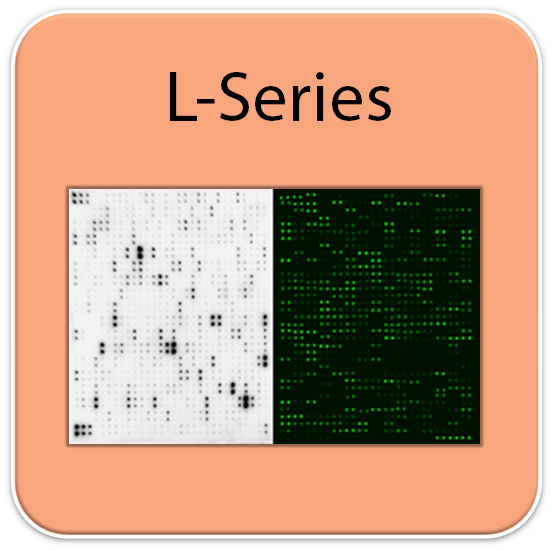Mouse L308 Array, Glass Slide
RayBio® L-Series Mouse Antibody Array 308 Glass Slide Kit. Detects 308 Mouse Proteins. Suitable for serum, plasma and cell culture supernatants.
Product Description
Specifications
| Size | 4 Sample Kit, 8 Sample Kit |
|---|---|
| Species | Mouse |
| Quantitative/Semi-Quantitative | Semi-Quantitative |
| Number of Targets Detected | 308 |
| Compatible Sample Types | Cell Culture Supernatants, Plasma, Serum, Tissue Lysates, Other Body Fluids, Cell Lysates |
| Solid Support | Glass Slide |
| Method Of Detection | Fluorescence Laser Scanner |
| Design Principle | Label-based |
| Estimated Lead Time | 1-2 business days |
| Shipping Type | Blue ice |
| Storage | -20°C |

Amazon Gift Cards!
$5 Amazon gift card in every kit box purchased.
Kano A. Tumor cell secretion of soluble factor(s) for specific immunosuppression. Sci Rep. 2015 Mar 9;5:8913. doi: 10.1038/srep08913.
Species:
Mouse
Sample Type:
Conditioned Media (4T1 conditioned cells)
Guo W., Miller AD., Pencina K., et al. Joint dysfunction and functional decline in middle age myostatin null mice. Bone. 2015 Nov 5;83:141-148. doi: 10.1016/j.bone.2015.11.003. [Epub ahead of print]
Species:
Mouse
Sample Type:
Plasma (Bone remodeling plasma samples)
Ge H., Zhu H., Xu N., et al. Increased Lung Ischemia-Reperfusion Injury in Aquaporin 1-Null Mice Is Mediated via Decreased Hypoxia-Inducible Factor 2? Stability. Am J Respir Cell Mol Biol. 2016 Jun;54(6):882-91. doi: 10.1165/rcmb.2014-0363OC.
Species:
Mouse
Sample Type:
Tissue lysate (Lung Tissue lysates from CD1 strain of mice.)
Tang YL, Zhu WW, Cheng M, Chen LJ, Zhang J, et al. Hypoxic Preconditioning Enhances the Benefit of Cardiac Progenitor Cell Therapy for Treatment of Myocardial Infarction by Inducing CXCR4 Expression. Circ Res. 2009;104:1209-1216. DOI: 10.1161/CIRCRESAHA.109.197723
Species:
Mouse
Sample Type:
Conditioned Media (CLK cells (passages 7-8) 90% confluency in standard media, then transferred to a standard incubator or hypoxia chamber (0.1% O2) and cultured in DMEM containing 0.2% FBS. Twelve hours later, the media were collected, concentrated by usi
Ding Y, Yuan S, Liu X, Mao P, Zhao C, et al. (2014) Protective Effects of Astragaloside IV on db/db Mice with Diabetic Retinopathy. PLoS ONE 9(11):e112207. doi:10.1371/journal.pone.0112207
Species:
Mouse
Sample Type:
Tissue Lysate (Retina lysates)
Zhi-Feng W., Le-Yuan Z., Xia-Hui Z., et al. TLR4-Dependent Immune Response Promotes Radiation-Induced Liver Disease by Changing the Liver Tissue Interstitial Microenvironment during Liver Cancer Radiotherapy. Radiat Res. 2014 Dec;182(6):674-82. doi: 10.1667/RR13630.1.
Species:
Mouse
Sample Type:
Hepatic Fluid (Liver tissue interstitial fluid.)
Yang H., Xia L., Chen J., et al. Stress-glucocorticoid-TSC22D3 axis compromises therapy-induced antitumor immunity. Nat Med . 2019 Sep;25(9):1428-1441. doi: 10.1038/s41591-019-0566-4. Epub 2019 Sep 9.
Species:
Mouse
Sample Type:
Plasma (Stress and anti-tumor immunity model)
-
Great productOur lab has used this array three times for measuring secreted cytokines from macrophages with great results. We have used the testing service since we did not have access to the correct machine to read the slides. Samples were measured quickly with high quality data.
on
Write Your Own Review

